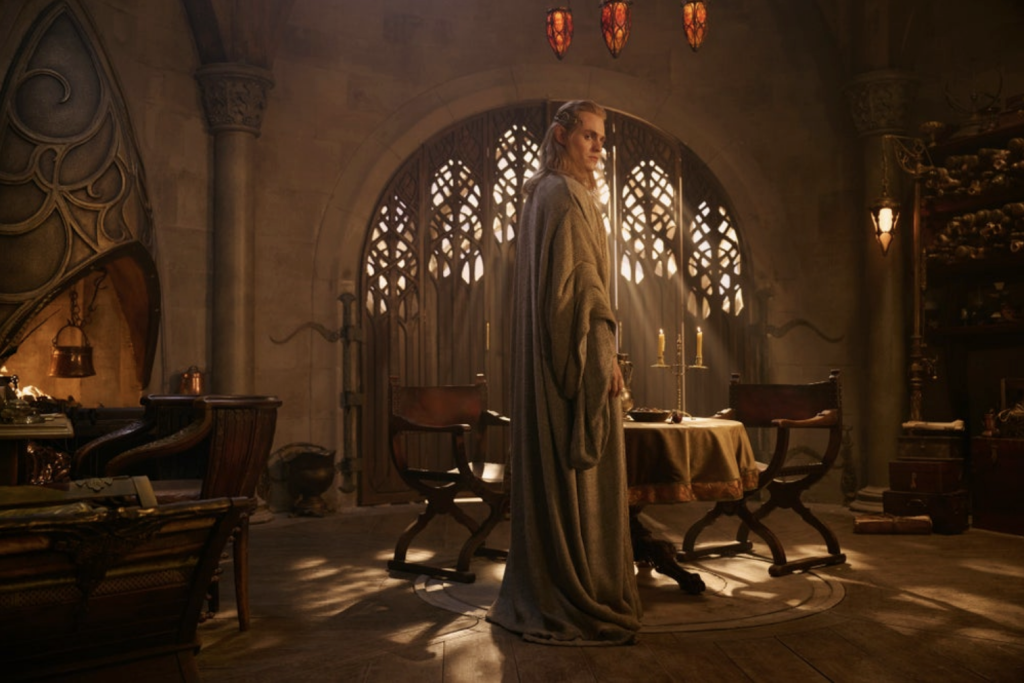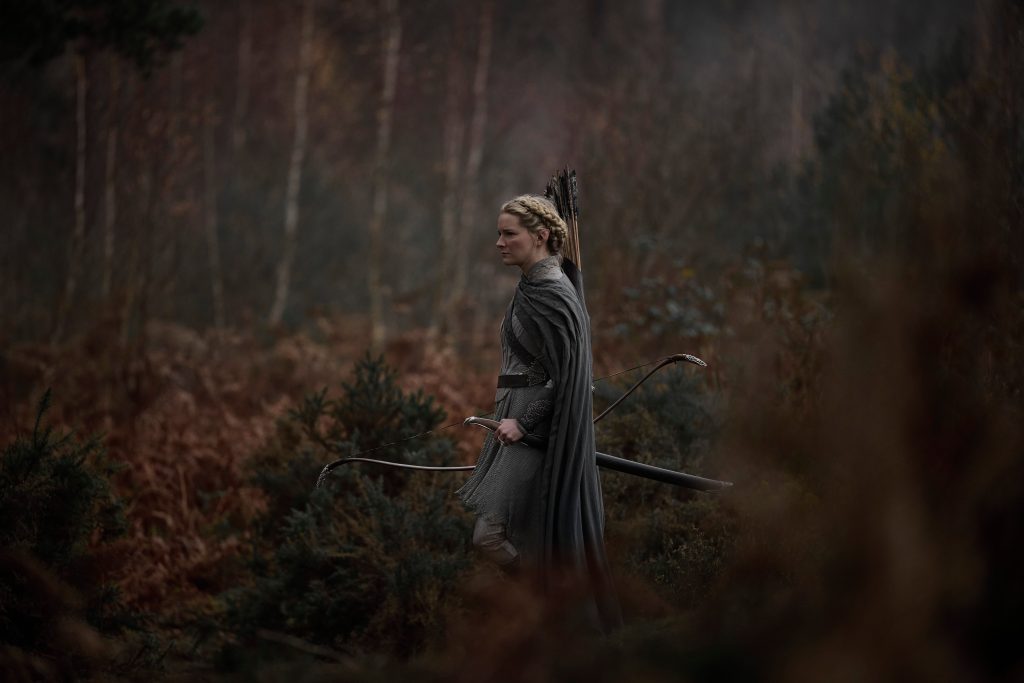Warning: Spoilers Ahead!
Despite vowing to give Amazon’s The Rings of Power another chance after a disastrous first season, it still took me almost a month to gather my courage and hit play, which should tell you all you need to know about this series. Before you get out your pitchforks and cast me into Mount Doom for being a “Tolkien purist,” let me say that my biggest issue with the series is not that it is unfaithful to Tolkien—any adaptation must make changes to the source material. However, the changes made here have turned the story into a generic fantasy tale that, though certainly epic in scope, remains largely unbalanced, burdened by too many side plots and characters.
Indeed, it takes the first three episodes to check in with all these characters, and unfortunately, the transition from the last season is less than smooth. Isildur, for example, who had been presumed dead after Mount Doom’s calamitous explosion, is somehow found by his horse alive in a spider’s lair. How he managed to get caught there, no one knows, but in truth, it hardly matters because the scene soon ends and goes nowhere. Likewise, the Stranger and Nori are lost in the desert. They have run out of food and water, which suggests they have been travelling for some time. Yet somehow, Nori’s friend Poppy finds them without trouble—and with water and biscuits, no less! I shouted ‘how?’ at my television so many times it started to lose all meaning.

Meanwhile, across the sea in Númenor, we are forced to suffer through superficial political scheming and stilted dialogue. This part of the story could have been one of the show’s most complex and tragic, but the plot moved so quickly I often wondered whether I had missed a scene (or ten), leaving the whole feeling messy and dull. Then we have the Dwarves of Khazad-dûm, the Elves, and the whole conflict with Sauron to contend with. But the show is not only stretched thin in terms of characters; somehow, the writers believed it to be a good idea to cover the forging of the seven Dwarf rings and the Nine, the creation of the Doors of Durin, the Siege of Eregion, and the awakening of the Balrog in Khazad-dûm in the span of about five episodes. These events occur over thousands of years and could have been the subject of multiple more balanced and carefully-paced seasons.
Many viewers have commented on how the show speeds up the timeline in comparison to Tolkien’s writings and how that is necessary to translate the tales of the Second Age into a coherent television show. However, Rings of Power not only condenses the timeline but presents major events out of order, resulting in an incoherent narrative. For example, the elven rings are forged first at the end of the last season, when they ought to have been forged last and in secret. In The Silmarillion, after Sauron creates the One Ring, the Elves realize he has deceived them and take off their rings, leading Sauron to wage war against Eregion. The sequence of events in the show makes little sense in comparison. Similarly, we see the creation of the Doors of Durin—something I had been eagerly looking forward to—but they only appear in a short scene as Celebrimbor unveils them to a group of elves and dwarves, thereby diminishing the dwarf Narvi’s role in their creation. More importantly, however, the Doors are meant to facilitate contact and trade between the Elves and the Dwarves in a time of peace, but we never get to see any of this alliance nor a single shot of the Doors in place in Khazad-dûm before we are told the doors have been shut after the Siege of Eregion.
There is simply way too much happening in Rings of Power. Even if each season consisted of ten episodes there would be too much happening, but with only eight, it feels like they are merely ticking off boxes with each major event. New characters are also indifferently introduced and remain entirely unmemorable, while interpersonal conflicts fall flat despite the dramatic swell of the music telling you that you should be feeling something.
Another ridiculous effect of the strange pace is that characters seem to traverse Middle-earth at the speed of light. For example, in one scene, the elf Arondir is in the environs of Pelargir (a city on the river Anduin in Gondor, in the south of the continent), and the next time we see him, he has reached Eregion (near Khazad-dûm in the north), where he arrives just in time to deliver much-needed aid to the Elves during the siege. I don’t think anyone would have wanted to watch an entire episode dedicated to the character’s journey, but some passing references to the passage of time would have gone a long way. As it stands, it feels like all these distant realms are next-door neighbours, making Middle-earth feel small and unimpressive.

One other major issue that must regrettably be addressed concerns the show’s treatment of female characters. Rings of Power has wisely sought to correct one of the biggest problems of Tolkien’s legendarium by including more women in the story. The creation of a female dwarf character in particular must be applauded, given how dwarf-women are entirely absent from Tolkien’s legendarium. However, the show has too often served us fridged women: Isildur’s mother passed away when he was a child and is invoked only to give him a tragic backstory. Meanwhile, Bronwyn dies off-screen between seasons one and two and thus seems to have been created solely to motivate her lover, Arondir, to go to Eregion in his quest for revenge against Adar. If that wasn’t enough to make your blood boil, the writers have also turned Galadriel from one of the wisest elves in Middle-earth—and the only one in Eregion to have suspected Annatar—into a stubborn elf who can only show strength through defiance and who was not only under Sauron’s thrall but in love with him when he was disguised as Halbrand.
There are a handful of great moments in this sophomore season: Durin IV and Disa remain a highlight, while Charles Edwards’ performance as Celebrimbor will no doubt be revered by fans as one of the very best alongside Andy Serkis’ Gollum and Richard Armitage’s Thorin Oakenshield. Unfortunately, the few great moments only highlight the show’s countless failures, and ultimately, Rings of Power remains a messy, poorly-paced, and soporific parody of Tolkien. Many fans have criticized Christopher Tolkien over the years for his condemnation of Peter Jackson’s film adaptations. As a fan and scholar of Tolkien’s works who was first introduced to Middle-earth through Jackson’s original trilogy, I find the prospect of new adaptations exciting, if only because they bring new fans to Middle-earth. But Rings of Power has shown me that perhaps Christopher Tolkien was right to keep such a tight hold on his father’s work.
